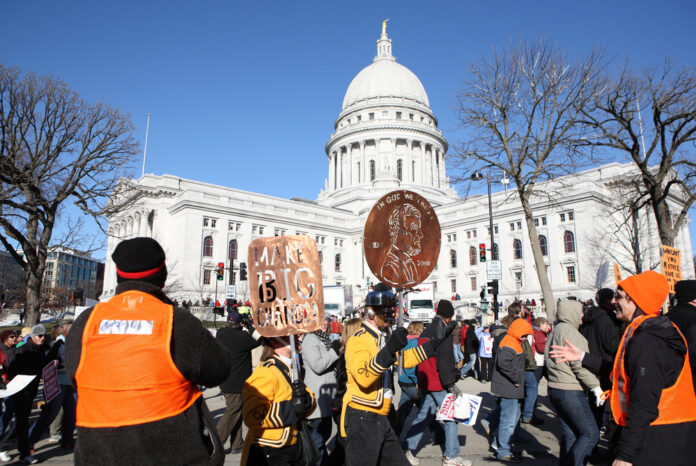A lawsuit filed in November 2023 by several public employee unions is seeking to overturn Act 10, the 2011 labor reform that has saved Wisconsin taxpayers $16.8 billion, according to the MacIver Institute’s running tally.
At the time of the lawsuit’s filing, Wisconsin House Speaker Robin Vos (R-Burlington) issued a statement, warning, “Now that the Wisconsin Supreme Court flipped to liberal control, special interest groups filed a lawsuit to repeal Act 10. If overturned, it would bankrupt schools and local governments right after we gave them a historic funding increase. … Justice Protasiewicz said during her campaign that she believes Act 10 is unconstitutional. She also told the media that she would consider recusing herself from any case challenging the law. Justice Protasiewicz participated in protests against the law and signed the petition to recall Walker.”
As recently as March 6, 2024, the court has seen activity on the case. Multiple motions to dismiss have been filed and at least one was granted, in mid-January; none of the filings appears to be available online, but you can follow the case at 2023CV003152 Case Details in Dane County (wicourts.gov).
The article below, first published in the Milwaukee Journal-Sentinel the day the suit was filed, provides useful background.
An alternative perspective is provided by the Badger Institute in two articles:
- In Act 10 fight, unions don’t just want you to pay — they want power – Badger Institute
- Economist vindicates Act 10 and common sense – Badger Institute
Unions File Lawsuit Seeking to Overturn Walker-era Act 10 Law
A conservation warden, president of AFSCME Local 1215 and plaintiff in the lawsuit
November 30, 2023
by Jessie Opoien
Milwaukee Journal Sentinel
USA TODAY NETWORK – WISCONSIN
MADISON – Several unions representing public employees are challenging Act 10, the Scott Walker-era law that severely curbed unions’ influence, sparked massive protests and reshaped Wisconsin’s political climate for years to come.
In a new lawsuit, plaintiffs cite a ‘dire situation’ in workplaces with issues including low pay, staffing shortages and poor working conditions.
The lawsuit argues the 2011 law violates equal protection guarantees in the state Constitution by dividing public employees into two classes: ‘general’ and ‘public safety’ employees. Public safety employees are exempt from the collective bargaining limitations imposed on ‘general’ public employees.
‘I worked for 13 years as a firefighter paramedic in Wisconsin, where I had the freedom to negotiate; however, when I became law enforcement for the Department of Natural Resources, I immediately lost my right to a voice on the job,’ Ben Gruber, a conservation warden, president of AFSCME Local 1215 and plaintiff in the lawsuit, said in a statement.
The challenge was filed in Dane County Circuit Court. Plaintiffs include Gruber, the Abbotsford Education Association; the American Federationof State, County and MunicipalEmployees (AFSCME) Locals 47 and 1215; the Beaver Dam Education Association; Beaver Dam teacher Matthew Ziebarth; SEIU Wisconsin; Racine Unified School District employee Wayne Rasmussen; the Teaching Assistants’ Association Local 3220 and the International Brotherhood of Teamsters Local 695.
‘The end of Act 10 would mean that we would have a real say again in our retirement plans, health care and time off — without the threat of loss of our union every year,’ Rasmussen said in a statement.
Repealing Act 10 ‘would bankrupt schools and local governments right after we gave them a historic funding increase,’ Assembly Speaker Robin Vos, R-Rochester, said in a statement.
‘This is another attempt by liberal special interest groups to undo the law to please their donors now that there’s been a shift in the court,’ Vos said.
Act 10 ended the ability of public-sector unions to negotiate over any issues other than raises, and those raises were capped at the rate of inflation. In addition, unions were required to hold annual elections to maintain their ability to negotiate for those raises. For those elections, they must win a majority of all eligible members, not just those who cast votes.
Public workers earning $50,000 a year saw their take-home pay shrink by about 8.5% because they had to pay more for their benefits, according to an analysis by the nonpartisan Legislative Fiscal Bureau at the time.
Four years after Act 10 passed, Republicans approved a right-to-work law that limited the power of private-sector unions.
A 2022 analysis by the Wisconsin Policy Forum found that, since 2000, no state saw a larger decline in the proportion of its workforce that is unionized than Wisconsin — a significant development in the state that served as the birthplace of AFSCME and was the first to allow public-sector unions to negotiate contracts in 1959.
The law’s passage launched a wave of recall elections. Its architect, Republican former Gov. Scott Walker,became the first governor in U.S. history to survive a recall challenge, and former Lt. Gov. Rebecca Kleefisch became the first lieutenant governor to face one, as well as the first to survive one.
Thirteen state senators faced recalls over Act 10 — 10 Republicans and three Democrats. Most incumbents won, but Democrats managed to unseat three Republicans. That was enough to give them control of the Senate in the summer of 2012, but the victory came when the Legislature was out of session and was short-lived. Republicans took back the majority that fall.
The attention from Act 10 made Walker a national figure, giving him a chance to launch a bid for the presidency. For weeks, he topped polls among conservatives, but he quickly abandoned his campaign after Donald Trump’s popularity among Republicans took off.
Previous legal challenges to the law have failed, but the latest move comes months after liberal state Supreme Court Justice Janet Protasiewicz was sworn in, flipping the high court’s majority for the first time in years. Unions at the state and national level contributed more than $560,000 to Protasiewicz’s campaign and the Democratic Party of Wisconsin — not accounting for individual contributions made by members.
Protasiewicz told the Milwaukee Journal Sentinel editorial board in March she would consider recusing herself from cases involving Act 10 based on her opposition to the law, including participating in protests in 2011 and signing a Walker recall petition.
‘I’d have to think about it,’ Protasiewicz said. ‘Given the fact that I marched, given the fact that I signed the recall petition, would I recuse myself? Maybe. Maybe. But I don’t know for sure.’
Republicans have touted the law’s savings and said it gave elected officials and the public more control of their government, while Democrats have argued it hurt schools and decimated employee morale by taking away the ability of teachers, correctional officers and others to help decide their working conditions.


